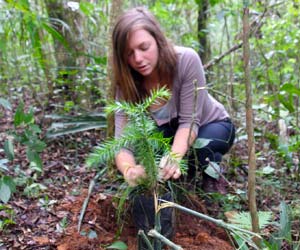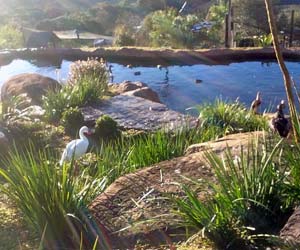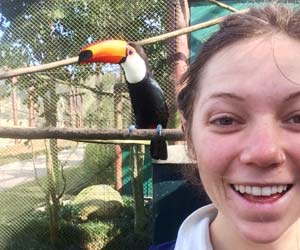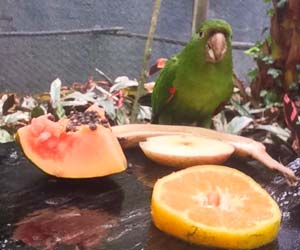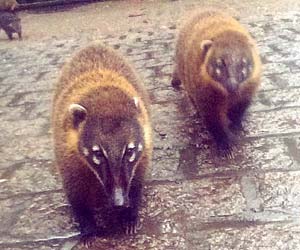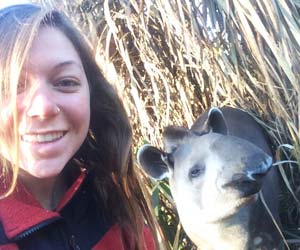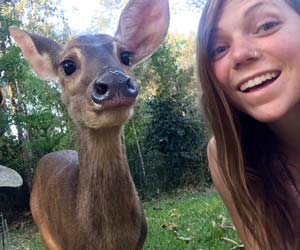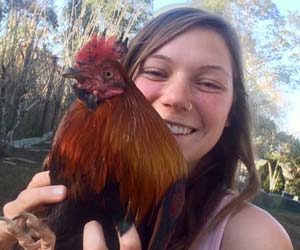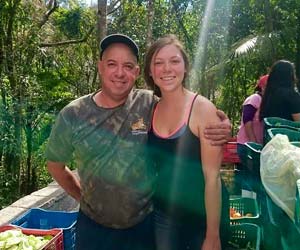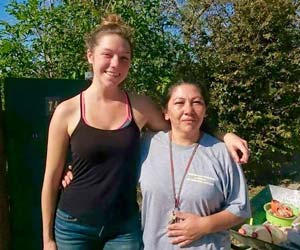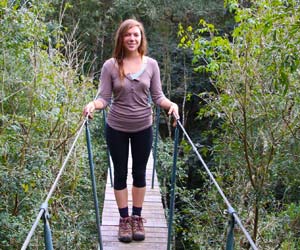Madison - Pre-Vet Wildlife Volunteer
A Pre-Vet Volunteers at a Brazilian Wildlife Sanctuary
Madison loves animals and felt drawn to South America, a region she always wanted to explore. The opportunity to work at a wildlife sanctuary in Brazil -- a country with the greatest diversity of flora and fauna on the planet -- made so much sense, that Madison’s dad encouraged her to stay a full 6 weeks.
He said, "If you’re going all the way to Brazil, go for as long as you can. Make the most of it,’” Madison remembers.
Still -- “I’ll admit, it was scary at first,” Madison chuckles.
She fought her sense of culture shock when she landed in Brazil and made her way by taxi to her hotel. The next day, ELI’s program coordinator picked her up and drove her to the 180-acre preserve outside of Curitiba, a city some 400 miles south of Rio de Janeiro. The facility, closed to the public, is a naturalist’s paradise: filled with indigenous plants and a sanctuary to a huge variety of animals, many of them endangered. Soon, Madison found herself relaxing and before she knew it, she was thinking “This is the coolest thing ever.”
Madison lived in a house on the property, in a room above the kitchen where she prepared most of her meals.
“I’m a vegan, so I’m used to cooking for myself. Some of the other volunteers relied more on food that was brought to the site, often by the staff that worked there.”
The food was healthful and plentiful, and included meat, cheeses, eggs, rice, beans, cereal and a lot of fruit and vegetables.
Although Madison’s daily schedule depended largely on the staff and the particular person she was working with, it usually began fairly early, around 7 a.m. After a quick breakfast, she’d accompany staffers as they prepared food for the animals, fed them and cleaned their cages. It’s physical, often messy work, and Madison appreciated the rubber boots available onsite.
“The more picky volunteers could consider bringing their own,” she suggests.
By lunchtime, which she’d eat at the main house, a giant truck would arrive from Curitiba filled with donated food from local grocery stores. This too would be prepared for the animals according to their particular needs and diets.
For this pre-veterinary student, the animals at the sanctuary were a revelation.
“I’m used to domestic animals, and here I was working with these exotic wild animals, and species you don’t find anywhere else in the world!”
Her favorites included little spotted cat (oncilla), among the smallest wild cats in South America; the rare bush dogs and maned wolves.
In the afternoons, the center’s biologist or veterinarian would arrive, and Madison was often invited to go on their rounds and to observe medical care administered by the vet. Here too, the work was hands-on, and sometimes alarmingly up close.
“In fact, I was bitten by a monkey,” she says. “She was in her cage, but very mad at us.”
Madison and the vet researched the risk of rabies (considered very low in that instance;) a thorough cleaning and an antibiotic sufficed.
“My dad was more worried than I was,” she laughs. “It’s just what happens when you work with animals.”
Work ended usually by 4 p.m., and Madison would retreat back to the house, for dinner and a long, quiet evening. There are some books and DVDs in the house, but Madison made use of the time to study for the GREs.
Weekends were for travel and exploring. When the veterinarian heard Madison was planning a trip to see the spectacular, iconic Iguazu Falls, he offered to take her there himself. In fact, the two became friends, and he even helped Madison with the Personal Statement she used in her grad school applications.
“He’s someone I will definitely keep in touch with. We still talk.”
In retrospect, Madison says the two biggest lessons she learned at Curitiba were the invaluable insight she gained into the huge variety of wildlife in the world -- and learning the art of communication.
“Many of the people I worked with spoke very little English,” she says. “I ended up learning a lot of Portuguese, but I also learned how to make myself understood - and understand others - without a common language between us.”
Today she’s a big advocate of the Brazil wildlife program, and hopes her advice will inspire others to follow in her footsteps.
“It was such an unforgettable experience. I learned so much about animals, and about Brazil’s inviting and very friendly culture. I’d really encourage people to go.”
Madison's Tips
Learn some Portuguese before you go! You will pick up plenty there, but going to Curitiba with some basics will definitely speed up the process.
Be open to trying new things. That includes experiences, food, and cultural opportunities.
Bring the right clothes. It gets surprisingly cool in the winter evenings. Madison recommends layers, fleece, hiking shoes, rain boots if you want your own, and definitely a waterproof jacket and pants.
Bring things to keep you busy in the evenings. This is the perfect time to catch up on all your reading; keeping a journal; playing cards and/or board games; or, like Madison, studying for the GREs.
Thanks for being such a dynamic and helpful volunteer, Madison. Wishing you luck with veterinary schools - and beyond.
Interviews
- ARGENTINA - HIV
- BRAZIL - Wildlife
- BRAZIL - Wildlife
- CAMBODIA - Buddhist Monks
- CAMBODIA - Children
- CAMBODIA - Microfinance
- CHILE - Literature
- CHILE - Equine Therapy
- CHINA - Journalism
- CHINA - Urban Planning
- ECUADOR - Medical
- ECUADOR - Teaching
- ECUADOR - Physical Therapy
- ECUADOR - Veterinary
- ECUADOR - Youth
- GHANA - Orphanage
- GUATEMALA - Teaching
- INDIA - Women's Programs
- INDIA - Health & Youth
- INDIA - Journalism
- INDIA - Women's Empowerment
- IRELAND - Art Gallery
- IRELAND - Art
- IRELAND - Law
- IRELAND - Museums
- IRELAND - PR
- IRELAND - Veterinary I
- IRELAND - Veterinary II
- MEXICO - Youth
- NEPAL - Construction
- NEPAL - Orphanage
- NEPAL - Orphanage
- NEPAL - Veterinary
- NICARAGUA - Teaching
- NICARAGUA - Unwed Mother Support
- PERU - Teaching
- PHILIPPINES - Nutrition
- PHILIPPINES - Nutrition
- PORTUGAL - Fighting Food Waste
- PORTUGAL - Housing for the Poor
- SOUTH AFRICA - Public Health
- SOUTH AFRICA - Public Health
- SOUTH AFRICA - Engineering
- SOUTH AFRICA - Nutrition
- THAILAND - Elephant Camp
- THAILAND - Elephant & Medical
- THAILAND - Journalism
- THAILAND - Physical Therapy
- UGANDA - Medical
- UGANDA - Medical
- UGANDA - Medical
- UGANDA - Microfinance
- VIETNAM - Pharmacy
- VIETNAM - Women
